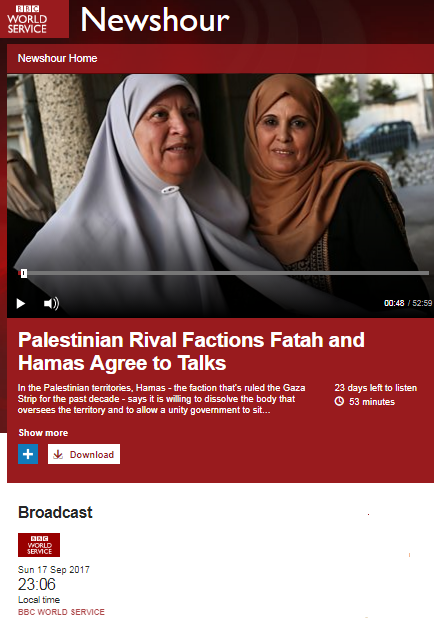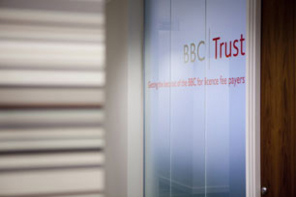As documented here previously (see here and here) the afternoon edition of the BBC World Service radio programme ‘Newshour’ on September 17th devoted over a third of its airtime to coverage of a 106 word statement put out by Hamas earlier that day.
That subject was also the lead story in the evening edition of ‘Newshour‘ on the same day.
“In the Palestinian territories, Hamas – the faction that’s ruled the Gaza Strip for the past decade – says it is willing to dissolve the body that oversees the territory and to allow a unity government to sit ahead of new elections. We get reaction from an Israeli MP and a senior Hamas official.”
Presenter James Coomarasamy’s dramatically worded introduction to the first part of the twelve minute-long item (from 00:47 here) once again misled listeners by implying that the 2006 PLC election was confined to the Gaza Strip and that Hamas has ruled the territory since 2006 rather than 2007.
[emphasis in italics in the original, emphasis in bold added]
Coomarasamy: “Now we begin with a slim shaft of light piercing the darkened corners of the moribund Middle East peace process. It holds out the potential for reconciliation; not yet between the Israelis and Palestinians but within the Palestinian political family itself. Hamas – the faction that has ruled Gaza for the past decade – says it’s willing to dissolve the body that oversees the territory and allow a unity government to sit ahead of new elections. That government would be headed by the 82 year-old leader of the Palestinian Authority Mahmoud Abbas whose Fatah faction lost the election in Gaza in 2006 and whose rule has since then been confined to the West Bank. Hamas – regarded as a terrorist organisation by the United States, the European Union and Israel among others – agreed to the change at talks in Cairo. Well Gaza has long been subject to a blockade by Egypt and Israel and in recent months there’s been added pressure from the Palestinian Authority which has significantly reduced the electricity supplies to the territory. So will this agreement stick or will it quickly peel away like previous expressions of unity? The long-suffering citizens of Gaza are divided.”
After listeners had heard two ‘random man in the street’ interviews, Coomarasamy went on to present an edited version of his previous conversation with Fatah’s Nabil Shaath, including the unchallenged description of the Israeli government as “colonialist”.
Shaath: “I do not see how we can face Netanyahu and his extreme right-wing settler colonialist government and we cannot really make use of any potential changes in the world if we are not united.”
Coomarasamy then spoke to MK Sharren Haskel, finding it necessary to make a clarification at the end of their conversation:
Coomarasamy: “Sharren Haskel, that Likud party MP there, referring during the interview to Mahmoud Abbas as Abu Mazen and Judea and Samaria…eh…also…eh…known as the West Bank.”
Listeners next heard analysis from BBC Jerusalem bureau correspondent Yolande Knell which was similar to her contribution in the earlier edition of the programme and repeated the claim that:
Knell: “…Israel always accuses Mr Abbas of not representing all the Palestinian people…”
Knell also told listeners that “positive comments” from the UN’s Middle East peace process coordinator should be interpreted as “acknowledgement that Hamas must be brought into the political scene”.
Later on in the programme (from 30:08 here) Coomarasamy again returned to the same topic.
Coomarasamy: “Let’s get more now on our main news today: the news that the Palestinian group Hamas has agreed to dissolve the body which controls the Gaza Strip and to allow a unity government to oversee that territory before the first election there since 2006 takes place. Well, earlier in the programme we heard reactions to this agreement – that was announced after talks in Cairo – from the rival Palestinian faction Fatah and from an MP with the ruling party in Israel. Well, for more insight into why the decision was taken, I’ve been speaking to Ghazi Hamad who’s a senior Hamas official in Gaza.”
Throughout that interview BBC regular Ghazi Hamad made repeated references to the ‘peace process’ which of course has been completely rejected by Hamas throughout all its decades of existence – although Coomarasamy made no effort to clarify that relevant point to his listeners.
Hamad: “The Egyptians succeeded to convince them [Hamas] that now it’s a good time now to start reconciliation with Fatah factions and because the miserable situation of the region and because of the problems in the peace process. So we need now to bring the policy and together and they succeed to convince Hamas that you have to show more flexibility.”
Coomarasamy: “What’s convinced Hamas then that this is the right time? What has convinced Hamas that these are the right conditions?”
Hamad: “You know, you know before that many people involved and there were many mediations between Hamas and Fatah but Hamas was doubtful about the intention of the president Abu Mazen to implement the agreement. So they found that Egypt is a big country and Egypt could be a good guarantee. They can give some assurances that they can keep and protect the agreement.”
Coomarasamy: “What about the pressure that’s been placed on Hamas, on Gaza, by – well, obviously by years of a blockade from both Israel and Egypt – but more recently by the electricity being cut off for many hours during the day? What role has that played in this decision?”
Listeners then heard that Hamas is “suffering” and – as was the case with one of his previous interviewees – Coomarasamy failed to challenge the inaccurate depiction of counter-terrorism measures as a “siege”.
Hamad: “I don’t…I don’t deny that [the] situation in Gaza’s very, very hard. People are suffering. Hamas is also suffering because not easy now to rule Gaza and the policy of the political isolation from the international community, from the blockade and siege on Gaza from the Israeli occupation and also from some action taken by the President Abbas against Gaza, ‘specially when he cuts part of the electricity and he stop paying salaries and paying some services in Gaza. I know that Hamas is working hard in order to offer services for people but I know it’s not easy for them to continue for [a] long time.”
Predictably, Coomarasamy refrained from asking Hamad why Hamas did supply electricity to the homes of its own officials even as the ordinary people in Gaza had to make do with three hours a day or why the terror group prioritises spending on weapons and tunnels over the welfare of the civilians in Gaza.
Coomarasamy: “Why is this going to be any more successful than previous attempts to form a government of national unity that have come to nothing?”
Hamad: “For many reasons. First of all I think that President Abbas he needs to show the world that he is the president for the whole Palestinian territories and now because he’s going now to give a speech in the United Nations and to meet the President Trump and he want to show that he’s real represent for the Palestinian people. And the same time because he is suffering that the peace process is failed and now there’s no horizon for the peace process and also big division affects the ability of the Abu Mazen to achieve any achievements or goals from the Israeli side. And the same time because Hamas also the big crisis in Gaza and they need to get out from this crisis and to reduce the burdens on their shoulders because they have 2 million people who need services and health, education, sewage, water and you know the situation in Gaza is not easy. So I think both of them they need each other. They need now to work together to find a new track for struggling against the occupation and the same time for improving the services, especially in Gaza.”
Coomarasamy: “The Israelis are very sceptical that this will come to anything and this will make any difference whatsoever to the peace process.”
Hamad: “I think Israel is not interested in peace. I think that Israel will try now – they will try – to uproot all the Palestinians at terms no to be united because it’s the interest – a big interest for Israel – to keep West Bank isolated completely from the Gaza Strip and to make a split between Hamas and Fatah. This is a golden opportunity for Israel to continue its colonial project especially in the West Bank and Jerusalem. I think that it’s time now for Hamas and Abu Mazen to understand there is no other choice. We have to work together and we have to struggle against the occupation.”
Failing to challenge that additional allegation of ‘colonialism’, Coomarasamy closed the softball interview there. As we see, although he did find it necessary to clarify to listeners that Judea & Samaria is “also known as the West Bank”, Coomarasamy did not ask Hamad to clarify his use of the term ‘occupation’ or challenge Hamad’s preposterous allegations that Israel is responsible for both the lack of progress in the peace process and the Hamas-Fatah split. Most importantly, Coomarasmay avoided the all-important question of whether this particular ‘unity deal’ will mean compliance with existing agreements between the PA and Israel – including the disarmament of terror groups.
Although ‘Newshour’ devoted nearly a third of the airtime in its two September 17th editions to this one story, listeners heard little information crucial to its proper understanding. They did however hear completely unchallenged politicised messaging on a ‘siege’ and ‘colonialism’ that do not exist.
Related Articles:
The BBC World Service’s Hamas-Fatah ‘unity’ binge – part one
The BBC World Service’s Hamas-Fatah ‘unity’ binge – part two
Superficial BBC reporting on Hamas-Fatah ‘unity’ returns




